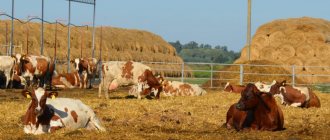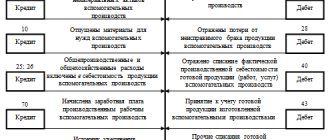What is a peasant farm and what is the difference from an individual entrepreneur?
A peasant farm is a peasant farm, regulated by clause 5 of Art. 23 of the Civil Code of the Russian Federation and the Federal Law “On peasant (farm) farming” dated June 11, 2003 No. 74-FZ. It is one of the forms of entrepreneurial activity in the Russian Federation. At its core, it is an association of citizens (Russian Federation, foreign, stateless persons) who are relatives or related by property (up to 5 non-relatives are allowed). These persons must own a plot of land, which results in joint agricultural activities (production, processing, storage and sale of agricultural products). Absolutely any activity (within agriculture), not necessarily all its types, but, importantly, all members of the peasant farm should be engaged in it. Members must be 16 years of age or older. Their number is not limited.
From here you can see an important difference from an individual entrepreneur - an individual entrepreneur can hire hired workers and not work himself, but everyone works here, although hired workers can also be hired.
Another difference is that the individual entrepreneur is individual. Peasant farms are often group (although you can register for one person). Moreover, both of these forms of doing business do not imply the formation of a legal entity.
The individual entrepreneur is liable with all his property for his obligations. Members of peasant farms bear subsidiary liability within the limits of the property that is specified in the agreement when creating the peasant farm. In other words, a peasant farm is a kind of entity like an LLC, but “tailored” for agriculture, and is not a legal entity.
Individual entrepreneur head of peasant farm
Even one citizen can create a peasant farm, who will acquire the status of Head. This person is empowered to act on behalf and in the interests of the farm. This factor is fundamental. In other words, two subjects appear: the household and the Head. This is a kind of division of functionality: the farm is entrusted with production and economic functions, and the Head defends its interests. The head acquires the right to act on behalf of the farm, as well as entrepreneurial legal capacity, only after recognition by all members of the farm.
What is the difference between an individual entrepreneur and an individual entrepreneur GKFH:
- The individual entrepreneur acts in his own interests, on his own behalf.
- Individual Entrepreneur GKFH defends the interests of the economy.
- The individual entrepreneur independently directs the business, acquires rights and bears responsibility. The head of the peasant farm acts only within the powers established by the agreement.
The head of a peasant farm is prohibited from conducting business that is not related to the interests of the farm and is outside the scope of his regulated powers, on his own behalf.
The Civil Code regulates the following powers of the State Property Committee:
- organization of farm activities;
- representation of interests and actions on behalf of peasant farms;
- granting powers of attorney;
- hiring and dismissal of personnel;
- organization of accounting;
- other powers by agreement.
Thus, the members delegate leadership functions to the Chapter. However, the head’s status as an individual entrepreneur does not mean the latter’s full property liability for the farm’s debts. Even if the Head is an individual entrepreneur, property liability for the obligations of the farm is divided among all members in proportion to their shares.
GKFH has the right to enter into transactions that are necessary for the functioning of the economy. The head should not commit actions that infringe on the rights and interests of the peasant farm.
What is the price
The question about the cost of a peasant farm should be divided into two sub-questions: How much does it cost to register a peasant farm, and how much does it cost to open a peasant farm “from scratch”.
Let’s dwell on the question “how much does it cost to register”:
- state registration fee 800 rub.
- Certificate from a notary, form P21002 - 1500 rub.
- Notarized power of attorney from 2000 rub.
- Notarized copy of the applicant's passport within 1000 rubles.
Notary costs are required if the applicant will not submit the documents himself.
Problems of the legal status of peasant farms
Registration
According to Art. 23 of the Civil Code, the head of a farmers’ association can be a person who was previously registered as an individual entrepreneur. But in practice, the tax inspectorate can often refuse to register a peasant farm, based on the Decree of the Government of the Russian Federation No. 630. This document states that when registering without forming a legal entity, the same rules apply as when creating an individual entrepreneur. And according to the legal norms governing the rules for the creation of legal entities and individual entrepreneurs, a citizen cannot open a new association if his previous registration remains in force.
In addition, this causes a legal conflict: if you open a farm without forming a legal entity, only the right of an individual entrepreneur to engage in commercial activities related to making a profit is fixed, but not the creation of a new organization.
Status of the head and members
According to clause 2 of Article 23 of the Civil Code of the Russian Federation, the head of the association acquires the status of an individual entrepreneur who enters into a rental agreement with other participants. But the legal norms do not clearly indicate the status of the remaining members of the farmer/peasant association.
The Law on Peasant Farming, adopted in 2003, replaced the previous similar regulatory act adopted in 1990. The new version does not provide for the opportunity to open a farmer association with legal status. faces. Since that time, their managers have received the status of entrepreneurs and must submit all reports themselves.
Those who had this status at the time the law was adopted could retain it until January 1, 2010, which was later extended for another 3 years. In 2012, the President of the Russian Federation signed a decree according to which farmer associations were given legal status. person, namely a commercial organization. This legal norm should have led to the abolition of clause 2 of Article 23 of the Civil Code and eliminated the contradiction.
However, later the above-mentioned article was supplemented by paragraph 5, according to which peasant farms are recognized as a voluntary association of citizens. It can be created on the basis of a regular agreement on the creation of a peasant farm. In this case, one person can be a member of several companies.
What documents are required
To register a peasant farm, you must submit the following documents to the registration authority at the place of residence of the head of the peasant farm:
- Agreement on the creation of a peasant (farm) enterprise (necessary if the enterprise consists of two or more members);
- Application for state registration of a peasant (farm) enterprise in the form P21002;
- A copy of the main identification document of the head of the peasant farm (passport);
- Receipt for payment of state duty (800 rubles);
- Notification of transition to a special tax regime.
It is also recommended to submit copies of documents confirming the relationship between members of the peasant farm.
If the head of the peasant farm is an individual entrepreneur
A peasant (also known as a farm) enterprise is an association of several people or one person who have property under the right of collective ownership and conduct joint activities with the aim of obtaining commercial profit. A peasant farm has the status of an individual entrepreneur registered with the tax service. The main difference between such an economy is the type of activity carried out: peasant societies are mainly engaged in poultry and sheep farming, dairy and meat production, fish farming, and so on.
Relations in peasant (farm) farms are regulated by Law No. 74-FZ. According to the provisions of this law, any person can become the head of a farm after registering as an individual entrepreneur, or simply by joining the ranks of participants in an already existing peasant farm. A peasant farm can also operate in the status of a legal entity. The law also describes in detail all the rights and obligations of any member of the household (if there are several):
-participants are given equal rights in making decisions regarding the activities of peasant farms;
- any participant can become the head of the farm after his candidacy is chosen by all participants;
-has the right to vote in choosing the head of the peasant farm;
-participants equally have legal rights to a share in the common property of the farm;
-by leaving the members of the peasant farm, a member of the company receives his share in monetary equivalent.
The head of a peasant farm, an individual entrepreneur, is universally recognized as his head by all members of the farm. This fact is reflected in the agreement on the creation of the farm (Article 4 of the federal law). The agreement must be signed by all its members. When creating a farm and electing its head, the latter must certainly have the status of an individual entrepreneur and have the appropriate certificate. The head of the farm becomes the owner of entrepreneurial legal capacity only from the moment of registration of the peasant farm, about which changes are made to the Unified State Register of Individual Entrepreneurs (form number P60005).
The rules of the Civil Code apply to the management of peasant farms, as well as to other individual entrepreneurs. Peasant farms conduct commercial activities without registering as a legal entity. The creation of a farm can be carried out by citizens of the Russian Federation, foreign nationals and persons who do not have citizenship but are related. At the same time, the law does not provide for experience in agricultural work or special education when registering peasant farms.
Thus, an individual entrepreneur can become the head of a peasant farm if he is related to its other members, namely:
-spouses, parents, their children, sisters and brothers, as well as grandparents, but no more than three generations. Younger family members can be accepted into the peasant farm upon reaching the age of sixteen;
-persons who are not related to members of the household can also join it. But their number should not exceed five people.
The head of a peasant farm, an individual entrepreneur, is exempt from the need for accounting; he fills out the established reporting documents: reporting to the Federal Tax Service, Social Insurance Fund (if there are employees) and the Pension Fund, statistical reporting. As a rule, peasant farms choose a taxation system - a single agricultural tax. It significantly reduces the tax burden, since the tax rate on it is only 6%. Heads of peasant farms are exempt from the need to submit personal income tax and VAT returns.
Any farm, by decision of its members, has the right to be recognized as a legal entity. This must be preceded by an application to the Federal Tax Service at the place of registration of the head of the peasant farm. The difference between this form of management will be the fact that all its participants will bear responsibility corresponding to the size of their shares in the peasant farm. At the same time, being, in fact, individual entrepreneurs, members of a farm are liable for obligations with personal property, which is regulated by the norms of the Civil Code.
The head of a peasant farm is a unique entrepreneur by nature. He simultaneously acts as the farm as a whole and is the head of this farm. Unlike an individual entrepreneur, the head of a peasant farm is not called the full name of the founder, he acts with the consent of other members of the company, and not independently (namely, at his own peril and risk), the types of activities of the peasant farm are determined at a meeting of its members, and not personally by the head. Thus, we can conclude that although a peasant (farm) enterprise is registered as an individual entrepreneur, it is a legal entity by type of management.
Useful articles:
Responsibility of an individual entrepreneur for obligations Benefits for individual entrepreneurs and their types Procedure for paying taxes by individual entrepreneurs
Share
Types of activities of peasant farms
In the OKVED classifier for agriculture, almost the entire section A is allocated.
Subsection 01.1 - annual plant crops, example 01.11.16 - growing buckwheat.
Subsection 01.2 - perennial plant crops, example 01.27.1 - growing tea.
Subsection 01.3 - growing seedlings, there is one example here, 01.30, the name is the same.
Subsection 01.4 - animal husbandry, example 01.41.12 - breeding of pedigree dairy cattle.
Within these subsections, select the types of activities (at least 4 characters) that you intend to engage in.
Individual entrepreneur - head of a peasant farm
We found out that the head of a peasant farm can be an entrepreneur - stat. 23 of the Civil Code does not prohibit this. An ordinary citizen (not an individual entrepreneur) also has the right to engage in activities in the agricultural sector if this participation is enshrined in the agreement in connection with the creation of a peasant farm. What method to choose for running such a business is up to everyone to decide for themselves, taking into account the available opportunities and their goals.
When making a decision, consider what scale of activity is planned; Keep in mind that the entrepreneur acts independently, and the creation of a peasant farm means compliance with the agreement approved by the farm. In addition, if you are planning to expand and plan to hire external employees (under employment contracts or within the framework of the GPA), the number of persons is limited to 5 citizen participants in farming. An entrepreneur is free to hire any number of workers. At the same time, for peasant farms the state offers a greater variety of subsidies, benefits, loans and other types of support.
In a word, as with any choice, when assessing in what status to register a future farm, weigh all the advantages and disadvantages - from the opening procedure to the taxation system used in conducting business.
Let's look at everything in order. What is an agreement on the creation of a peasant (farm) enterprise?
Immediately after determining the composition of the members of the farm, it is necessary to think through and formalize an agreement on the creation of a peasant (farm) farm. It acts as the main document regulating the operation of the farm, so all the basic information should be written down in it. First of all, regarding its members, their rights and obligations, the head of the economy and the scope of his powers. In addition, it is worth indicating the procedure for the formation of property, the specifics of ownership, use and disposal of it. Plus, this document formulates the procedure for accepting participants into the farm and leaving it, describes the principle of distribution of income and other results of work. In addition to this block of information, the agreement sometimes includes other additional provisions that comply with the legislation of the Russian Federation.
The agreement on the creation of a peasant (farm) enterprise is signed by each participant - a member of the enterprise. According to the law, documentation is attached to it indicating the existence of a relationship between members of the household. However, in fact, this requirement is often ignored, due to the fact that registration authorities are not authorized to verify the fact of relationship of members of the household. Yes, there is no verification, but it is still important to comply with the requirement of the law: a simple agreement will not be enough, and the presence of kinship is an indispensable condition for creating a farm.
An agreement on the establishment of a peasant (farm) enterprise is a basic document that is submitted to the tax authorities in order to carry out state registration. This is, in essence, an agreement on joint activities. And this document is most valuable not so much for the official representatives of the state, but for the participants themselves, because it regulates all aspects of activity, ownership, and disposal of property. That is why the development of this document requires especially close attention and responsibility: if the document is drawn up in detail, taking into account many nuances, this will help prevent misunderstandings and disputes between farm participants during joint work. The task of the tax authorities is to accept the agreement on the creation of a business, but without the registration mark (similar to how this is done with the charters of enterprises). Only information about the head of the farm is subject to inclusion in the state register, but information about other participants is not. That is why, when the composition of participants in a business changes, information is not submitted to the tax authorities.
The second most important document is an application for registration of a peasant (farm) enterprise P21002 model , which is similar to an application for registration of an individual entrepreneur, and therefore usually does not cause difficulties during registration.
Making a copy of the identity document of the head of a peasant (farm) enterprise is also not difficult. But it must be taken into account that when personally submitting papers for registration by the head of the household, notarization is not required, and the same applies to the application of sample P21002. Please note that the application for state registration is then signed in the presence of an employee of the registration authority, who established the identity of the applicant at the time of submitting the documentation. When the registration procedure is handled by an authorized third party, all documentation is notarized, and a notarized power of attorney must be issued to the representative.
An important aspect of registering a peasant (farm) enterprise is a receipt for payment of the state duty. The amount is 800 rubles, and it is paid on behalf of the head of the household. If the registration authority rejects the registration request, the state fee is not refundable, and when submitting a new package of documentation it is paid again.
In addition, in parallel with the state registration of a peasant (farm) enterprise, it is permissible to make a statement about the choice of special taxation (STS) . In this case, the chosen procedure will begin to apply from the date of state registration. That is why it is so important to think through in detail the nature of the activity from the standpoint of the most acceptable tax regime.
We presented a situation where a peasant (farm) enterprise included several participants. But an individual has the right to create a farm on his own. For this purpose, it is registered as the head of a peasant (farm) enterprise, providing all the above documents, with the exception of the agreement on the creation of a peasant (farm) enterprise. Naturally, in this situation this paper is not relevant.
Farm Registration Forms
Starting from the 90s and before the adoption of Federal Law No. 74 of June 11, 2003 “On Peasant Farms,” peasant farms could only be legal entities. Farms created from 2003 to 2014 did not have legal entity status. Starting from 2014, you can choose in what status to register your farm.
Back to contents
Entity
Registering a peasant farm as a legal entity has its advantages. Many large companies look at individual entrepreneurs with distrust and are more willing to work with legal entities, even though an individual entrepreneur is liable for his debts with all his property, and the same LLC - only with the authorized capital.
This is where the fun begins. On May 5, 2014, the President signed Federal Law No. 99, which entered into force on September 1, 2014 and amended the Civil Code regarding the functioning of legal entities. According to it, a peasant (farm) enterprise can be created in the status of a legal entity. But although by law you have the right to register a peasant farm as a legal entity, in practice this issue has not been worked out and the registration procedure does not currently exist.
Back to contents
Individual entrepreneur - head of peasant farm
So, the only possible registration option at the moment is to register the head of the farm as an individual entrepreneur, and then register the peasant farm itself.
Back to contents
Private household plot or peasant farm
By the way, you can do without registration at all and work as a personal subsidiary plot (LPH). The advantages of this status:
- No need to submit reports.
- No need to register.
Disadvantages of private household plots:
- Limitation on the area of land used. The area of a personal plot of land should not exceed 2.5 hectares.
- Less government support and fewer opportunities to get loans from banks.
- Inability to hire workers.
- Difficulties with selling products. Companies are very reluctant to sign contracts with individuals.
To summarize, we can say that if you are engaged in agricultural activities on your own plot and sell the surplus to your neighbors, you are a private household plot and you do not need to register anything. If you are planning a serious business, it is better to register a peasant farm.
Back to contents
Peasant farm accounting
A peasant farm, as an individual entrepreneur, must maintain a Book of Income and Expenses, as well as a Book of Business Operations. Entries in work books are made by the head of the peasant farm. Farms, like other employers, must submit reports to the Pension Fund and the Federal State Statistics Service.
In addition, the tax office will also require reporting. The reporting submitted depends on the chosen taxation system. The most preferable is the Unified Agricultural Tax: you will pay a single agricultural tax of 6% of net profit, in most cases this is the best option. You can also choose a simplified taxation system - simplified taxation system. Of course, according to the law, you can choose a general taxation regime, but it requires much more reporting.
Back to contents
Tax benefits
Tax benefits are a factor that is not the least important in choosing a farm as a type of business activity. Peasant farms are provided with the following benefits:
- For 5 years, no personal income tax will be charged on the income of the head and members of the peasant farm received from agricultural work. This benefit does not apply to other sources of income.
- Transport tax is not charged on agricultural machinery.
Back to contents











